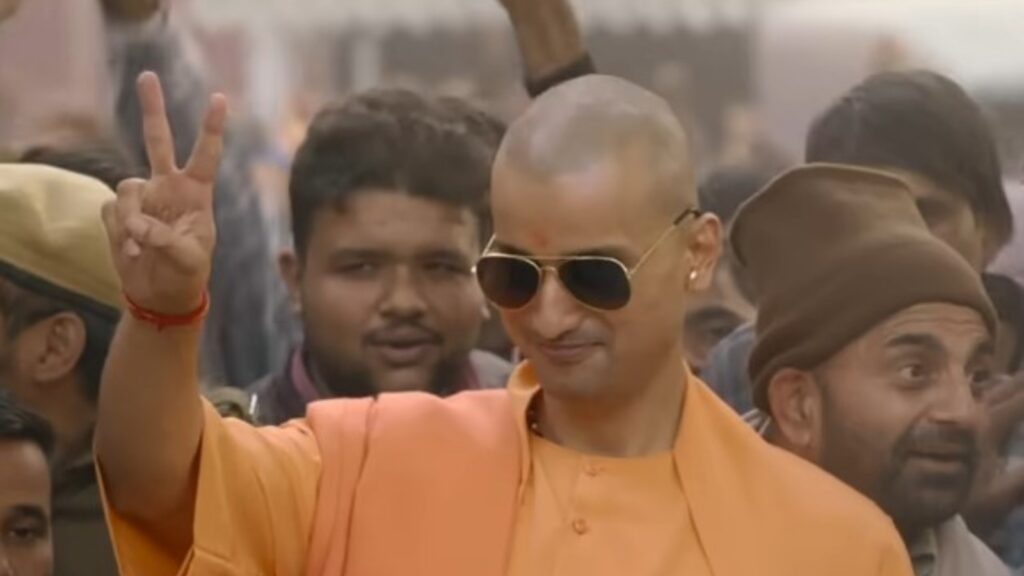THE BOMBAY High Court had to intervene to get Ajey: The Untold Story of a Yogi a release last month, after the Censor Board’s objections came in the way.
On Friday, the film, based on Shantanu Gupta’s book ‘The Monk Who Became Chief Minister’, on Uttar Pradesh CM Yogi Adityanath, was finally released – as per a PTI report, speaking to its US-based producer Ajay Mengi, in over 500 screens across India and many globally.
While officially the BJP did not react to the release of the film, the party MLA from Sarojini Nagar near Lucknow, Rajeshwar Singh, hosted a special screening at a multiplex. Apart from local office-bearers of the BJP, women associated with ‘Tara Shakti Sewing Centre’ as well as youth from ‘Ran Bahadur Singh Digital Education and Empower Centre’ were among the invitees.
Singh posted on X: “The inspiring journey of Yogi ji Maharaj’s struggles, penance, sacrifice and valor moved all the residents of Sarojini Nagar to tears.”
Speaking to ANI, BJP Lucknow North MLA Neeraj Bora said, “People are definitely excited to watch this film. It showcases CM Yogi’s struggle-filled life and his work for society and the nation. Everyone should watch it.”
Starring Bhojpuri star and former BJP MP Dinesh Lal Yadav ‘Nirahua’, among others, the film focuses on Adityanath’s life before he became UP CM, and ends with him resolving to fight the mafia.
In a dialogue reminiscent of what the CM himself said on the floor of the Assembly in February 2023, Ajey says in the film: “Jab tak main CM rahunga, yunhi mafiaon ka safaya hota rahega (As long as I am CM, mafias will keep getting eliminated).”
Anant Vijay Joshi, who plays Ajey, with mannerisms and body language reminiscent of the CM, says at another point in the film that he has no problem with any caste or religion.
As per the film’s plot, Ajey, the son of a forest ranger, faces injustice at the hands of the police in Rishikesh in 1989. His father then sends him to Kotdwar, where he gets enrolled for graduation in Science. However, Ajey rebels after the college administration fails to act against those who write obscenities against a woman student union leader on the men’s toilet wall. He tells the college authorities: “If I had Rs 200, I would have got that wall — on which the obscene remarks are written — demolished by a bulldozer.”
In the film, Ajey then contests the student union election on the plank of respect for women, but loses due to tampering with ballot boxes. Soon after, in 1992, he meets Mahant Avaidyanath, the head of the Gorakhnath Peeth, at a function at the Kotdwar college.
According to the film, Avaidyanath (played by Paresh Rawal) tells Ajey “the importance of politics for humankind”. Ajey then decides to leave home for Gorakhpur, and has his first encounter with a local bahubali called Mushtaq Ahmed on the way.
When he reaches Gorakhnath, Avaidyanath gives him the name ‘Yogi Adityanath’, and he starts doing public service. The film says that it is only when Avaidyanath chooses Ajey as his successor and the news spreads does his family get to know about his new whereabouts.
The film shows Ajey turning down an offer to join politics during the Ram Temple movement, and contesting elections only in 1998 after the district magistrate of Gorakhput treats him shabbily when he raises questions over lack of facilities for children with Japanese Encephalitis.
After becoming the Gorakhpur MP, Ajey holds janata darbars, where among other visitors is a woman belonging to the minority community, who says she came to him because she knows that, “sarkaar chaahe kisi ki ho, chitthi sirf baba ji ki kaam karti hai (whoever may be in government, it is only recommendation of Yogi ji that works)”.
H C Dhondiyal, who was at a multiplex in Noida to catch the film Friday, said he came to see how an ordinary villager rose to become CM. Belonging to Pauri Garhwal in Uttarakhand, like Adityanath, and settled in Noida where he runs a business, Dhondiyal said: “I feel both good intentions and luck worked for him. As the head priest of the Gorakhnath math, he got the support of the followers of the temple. That made his political journey easier.”
G S Bisht, who has a business in Lajpat Nagar, wondered why there was no publicity around the film. He also had his problems with the film. “Certainly, people have a sense of safety under Yogi’s rule. But only this aspect has been highlighted in the movie. The film should have shown more about his struggles.”
Vikrant Singh, who is preparing for UPSC in Delhi and belongs to Khajni in Gorakhpur district, studied in a college run by the Gorakhnath temple trust. Singh believes the movie “is very close to Yogi ji”. “He has worked in the education and health sector, and on law and order.” His issue is the choice of the actor to play Adityanath. “A better actor could have been picked.”
Abhinav Gurav, who is studying journalism at Delhi University, said curiosity about how Adityanath developed his ideology of Hindutva and the drive to crack down on criminals drew him to the film. “I got answers to most of my questions in the film.”

